 W
WAdobe ColdFusion Builder is the name for Adobe's Eclipse-based development IDE that can be used to build applications for ColdFusion. The product's original codename, "Bolt", is a reference to the original lightning icon for ColdFusion from the Allaire days. In 2010, Adobe released the product and officially renamed it Adobe ColdFusion Builder, often referred to as CFBuilder.
 W
WAdobe Acrobat Distiller is a software application for converting documents from PostScript format to Adobe PDF, the native format of the Adobe Acrobat family of products. It was first shipped as a component of Acrobat in 1993. Acrobat 4, in 1999, added preset configuration files to Distiller, and Acrobat 5, in 2001, added improved color management. Originally a separate application, Distiller eventually became incorporated into a printer driver for creating PDF files that preserved the printed appearance of documents from other applications.
 W
WAdobe Prelude is an ingest and logging tool for tagging media with metadata for searching, post-production workflows, and footage lifecycle management. Adobe Prelude is also made to work closely with Adobe Premiere Pro. It is part of the Adobe Creative Cloud and is geared towards professional video editing alone or with a group. The software also offers features like rough cut creation. A speech transcription feature was removed in December 2014.
 W
WAdobe Story is a discontinued collaborative script development tool from Adobe Systems Inc. It included scheduling tools, allowing schedules to be created from one or many scripts. Adobe Story was tightly integrated with Adobe Creative Cloud. It was available as a web-based application, a desktop application, and a mobile app. The desktop application could sync with the online version.
 W
WAirmail is an email client for iPhone and Mac OS X by Italian company Bloop SRL. It was based originally on the discontinued Sparrow client.
 W
WAlfred is an application launcher and productivity application for macOS. Alfred is free, though an optional paid upgrade ('Powerpack') is available.
 W
WThe Apple Loops Utility software was a small companion utility for Soundtrack Pro, GarageBand, Logic Express, and Logic Pro, all made by Apple Inc. that allowed users to create loops of audio that could be time-stretched. Audio files converted to Apple Loops via Apple Loops Utility could also be tagged with their publishing.
 W
WApple Qmaster is a system made by Apple Inc. that provides automated work distribution and processing for high-volume projects created with certain digital visual effects software packages: Shake, Autodesk Maya, Final Cut Pro, Compressor, DVD Studio Pro and any UNIX command-line program. It processes such jobs on a cluster of Mac or Xserve computers.
 W
WAppleJack was a command-line interface for Mac OS X that provided a simplified user interface for single user mode system repairs. It allowed for permission repair, disk repair, cache cleaning, validation of preference- and property list files, and removal of swap files on a boot drive, without needing a separate startup disk.
 W
WAppZapper is an application for Apple's macOS developed by Austin Sarner and Brian Ball.
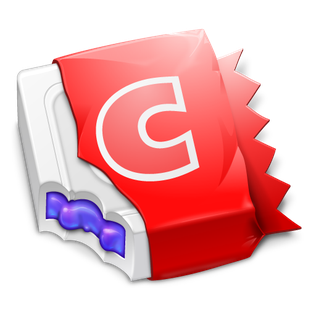 W
WCandyBar is an unsupported OS X application by Panic and The Iconfactory. Although macOS allows users to change icons for user-level files and folders, this is not possible for system files. The application replaces system icons with icons/docks of the user's choice and supports cataloging of icons. New icons and docks were available also from the Iconfactory website. CandyBar is the successor to The Iconfactory's iControl program for Mac OS 8 and Mac OS 9.
 W
Wcdrdao is a free utility software product for authoring and ripping of CD-ROMs. The program is released under the GPL. Cdrdao records audio or data CD-Rs in disk-at-once mode based on a textual description of the CD contents, known as a TOC file that can be created and customized inside a text editor.
 W
WChemDraw is a molecule editor first developed in 1985 by David A. Evans and Stewart Rubenstein. The company was sold to PerkinElmer in the year 2011. ChemDraw, along with Chem3D and ChemFinder, is part of the ChemOffice suite of programs and is available for Macintosh and Microsoft Windows.
 W
WClaris Home Page was one of the earliest true WYSIWYG HTML editors, developed from 1994 on. The project was code-named Loma Prieta. Claris purchased it from San Andreas Systems, reworked it to use the user interface common to all their products, and released it in 1996.
 W
WCompressor is a video and audio media compression and encoding application for use with Final Cut Studio and Logic Studio on macOS. It can be used with Qmaster for clustering.
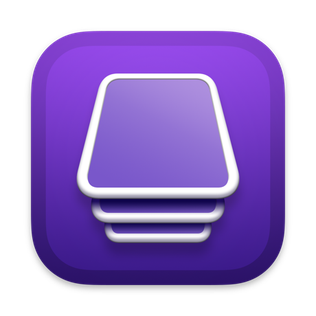 W
WApple Configurator is an application developed by Apple Inc. and is available for free download on the Mac App Store. It was first launched in March 2012. It replaces the iPhone Configuration Utility.
 W
WConflict Catcher is a discontinued utility software application that was written by Jeff Robbin and published by Casady & Greene for classic Mac OS. It aided Macintosh users in solving operating system conflicts with extensions and control panels. Conflict Catcher included a printed manual written by David Pogue.
 W
WCosmic Osmo's Hex Isle is a 3D puzzle/adventure game for Mac and Windows by Cyan Worlds and Fanista released on November 30, 2007. It is a sequel to the adventure game Cosmic Osmo and the Worlds Beyond the Mackerel, also by Cyan Worlds. Osmo has been incarcerated because of his extreme laziness. The aim is to help Osmo escape from his prison by touching a set of coloured hexagonal targets on each level.
 W
WCrystal Quest is an action game originally for the Macintosh. It was written by Patrick Buckland for Casady & Greene in 1987 and was ported to the Apple IIgs in 1989 by Rebecca Heineman. Ports were also made to the Amiga, Game Boy, iOS, and Palm. It was notable for being the first game to support the color displays on the Macintosh II.
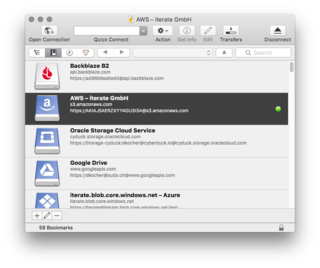 W
WCyberduck is an open-source client for FTP and SFTP, WebDAV, and cloud storage, available for macOS and Windows licensed under the GPL. Cyberduck is written in Java and C# using the Cocoa user interface framework on macOS and Windows Forms on Windows. It supports FTP/TLS, using AUTH TLS as well as directory synchronization. The user interacts with the user interface (GUI), including file transfer by drag and drop and notifications via Growl. It is also able to open some files in external text editors.
 W
WDaisyDisk is a paid disk space analyzer for macOS. It displays a sunburst diagram of files on a hard drive to help with the location or deletion of large files. It can display previews of files using Quick Look. It also allows the user to look at the file directly in Finder, in order to delete it or move it elsewhere.
 W
Wecto is a commercial weblog client for Mac OS X and Microsoft Windows. It allows one to compose and store blog entries on the local desktop computer, then upload them to a weblog host. ecto interacts with popular server software such as Blogger, Movable Type, and WordPress, among others. The developer believes the additional flexibility of the desktop operating system allows the client to incorporate features lacking in web-based clients. For example, ecto incorporates spell checking, easy insertion of images, and text formatting. ecto employs the standard controls the operating system provides to all applications. It can also trackback to other blogs and add categories and tags to a blog entry. The Macintosh version integrates with iTunes and iPhoto.
 W
WFluid is a WebKit2-based site-specific browser (SSB) for Mac OS X created by Todd Ditchendorf. Its original WebKit-based version was compared to Mozilla Prism and mentioned in Lifehacker, TechCrunch, 43 Folders, the 37 Signals blog, and on InfoWorld as a way to make web applications more like native desktop applications.
 W
WFugu is an SFTP client for Mac OS X. It has been abandoned by the developers as of 2011. The software as of that time is available on SourceForge.
 W
WFullPaint was a software program for the Apple Macintosh for graphics creation. It was developed by Ann Arbor Softworks and was sold as a more powerful alternative to Apple's MacPaint. One of the notable features that differentiated it from MacPaint was its resizable window, and with it the ability to scroll within the document using scroll bars rather than by dragging with the Hand Tool.
 W
WGNUMail is a free and open-source, cross-platform e-mail client based on GNUstep and Cocoa. It is the official mail client of GNUstep and is also used in Étoilé. It was inspired by NeXTMail, the predecessor of Apple Mail. GNUMail is based on the mail handling framework Pantomime. GNUMail demonstrated that it is possible to develop cross platform programs for GNUstep and Cocoa.
 W
WGrandPerspective is open source software for Mac OS X used for disk space analysis. The application was ranked #6 in the "50 Mac Essentials" list by Cult of Mac in 2010.
 W
WHyperEdit is an application for Apple's Mac OS X developed by Jonathan Deutsch.
 W
WIconBuilder is a popular plugin for Adobe Photoshop, Adobe Photoshop Elements and Macromedia Fireworks for the editing and creation of computer icons created and used by The Iconfactory. It supports all icon sizes for both Mac OS X and Microsoft Windows. IconBuilder was created when there was no official tool from Apple Computer for making icons in the .icns format introduced by Mac OS 8.5.
 W
WIGG Software is a Putney, Vermont-based software company that specializes in Mac OS X and iOS applications for personal finance management.
 W
WIndigo Renderer is a 3D rendering software that uses unbiased rendering technologies to create photo-realistic images. In doing so, Indigo uses equations that simulate the behaviour of light, with no approximations or guesses taken. By accurately simulating all the interactions of light, Indigo is capable of producing effects such as:Depth of field, as when a camera is focused on one object and the background is blurred Spectral effects, as when a beam of light goes through a prism and a rainbow of colours is produced Refraction, as when light enters a pool of water and the objects in the pool seem to be "bent" Reflections, from subtle reflections on a polished concrete floor to the pure reflection of a silvered mirror Caustics, as in light that has been focused through a magnifying glass and has made a pattern of brightness on a surface
 W
WInquisitor is a Cocoa plug-in for Mac OS X developed by David Watanabe.
 W
WInsanity Fight is a vertically scrolling shooter developed by Linel for the Amiga and originally published by Microdeal in 1987. An iOS port from the original programmer was released in 2014.
 W
WLibreCAD is a free computer-aided design (CAD) application for 2D design. It works on Linux, macOS, Unix and Windows operating systems.
 W
WLittle Snitch is a host-based application firewall for macOS. It can be used to monitor applications, preventing or permitting them to connect to attached networks through advanced rules. It is produced and maintained by the Austrian firm Objective Development Software GmbH.
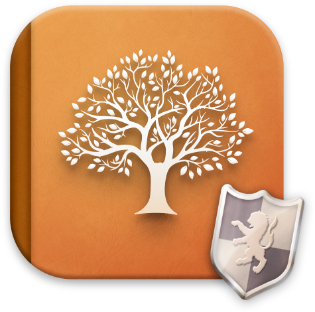 W
WMacFamilyTree is a commercial genealogy program for Mac OS X which helps users build their family tree, adding data about family members, including pictures and sound clips. The program allows the user to add sources for the information, with the ability of including scanned documents. It uses the Core Data API to store information internally but can import and export to the genealogy standard GEDCOM format. The program can also create a set of web pages for family members, and optionally upload them to their website, or to iDisk, to share with others.
 W
WMacintosh Guide, also referred to as Apple Guide, was Apple Computer's online help and documentation system, added to the classic Mac OS in System 7.5 and intended to work alongside Balloon Help. In addition to hypertext, indexing and searching of the text, Macintosh Guide also offered a system for teaching users how to accomplish tasks in an interactive manner. However, the process of creating guides was more complicated than non-interactive help and few developers took full advantage of its power. Apple enhanced the help system with HTML-based help in Mac OS 8.5 which worked in conjunction with Macintosh Guide providing links to Macintosh Guide sequences. Macintosh Guide was not carried over into Mac OS X, which uses an HTML-based help system.
 W
WMacTerminal was the first telecommunications and terminal emulation application software program available for the classic Mac OS. MacTerminal enabled users to connect via modem or serial port to bulletin board systems and online services, and to other computers. MacTerminal was capable of emulating the DEC VT100 and other computer terminals.
 W
WManOpen is a utility to view Unix manuals in a graphical environment instead of a terminal emulator such as Terminal. Included with the application is a command line utility called openman that will open invoked man pages in ManOpen. Internally ManOpen does not directly view the man page but runs it though Harald Schlangmann's cat2html or cat2rtf into HTML or RTF for viewing.
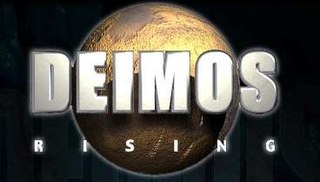 W
WMars Rising is a vertically scrolling shooter written by David Wareing and published by Ambrosia Software for Macintosh computers in 1998. Mars Rising's setting and gameplay has been compared to similar scrolling shooters Xevious and Raiden. It was followed by Deimos Rising in 2001.
 W
WMicrosoft Flight Simulator is a 1986 video game developed by subLOGIC and published by Microsoft for the Macintosh.
 W
WMicrosoft Office 98 Macintosh Edition is a version of Microsoft Office for the classic Mac OS, unveiled at Macworld Expo/San Francisco on January 6, 1998. It introduced the Internet Explorer 4.0 browser and Outlook Express, an Internet e-mail client and usenet newsgroup reader. Office 98 was re-engineered by Microsoft's Macintosh Business Unit to satisfy customers' desire for more Mac-like software.
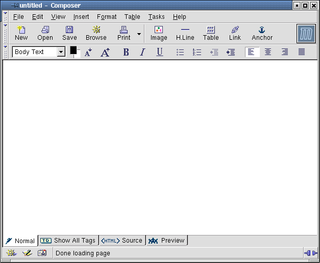 W
WMozilla Composer is the free and open-source HTML editor and web authoring module of the Mozilla Application Suite. It is used to create and to edit web pages, e-mail, and text documents easily. It is compatible with Windows, macOS and Linux. Composer is a graphical WYSIWYG HTML editor. One also can view, write and edit HTML source code with Composer.
 W
WNewsFire is an RSS newsreader developed by David Watanabe for Mac OS X. It supports Atom, RSS, and Podcasting. NewsFire features groups, labels, smart groups, search, and integration with iTunes, Spotlight, and weblog editors. NewsFire can also import and export a blogroll from and to OPML; however, it cannot import Google Reader OPML at this time due to a known bug.
 W
WPaparazzi!: Tales of Tinseltown is a video game developed by American studio Museworthy and published by Activision for the Macintosh.
 W
WPDF Expert is a PDF editing app for iPhone, iPad and Mac. It allows a user to read, annotate and edit PDFs, change text and images, fill in forms and sign contracts.
 W
WQuickTime Broadcaster is an audio and video RTP/RTSP server by Apple Inc. for Mac OS X. It is separate from Apple's QuickTime Streaming Server, as it is not a service daemon but a desktop application. It is able to stream live video and audio over a network in any QuickTime supported streaming codec.
 W
WRadical Castle is a point-and-click adventure game released for Macintosh in 1986 and distributed as shareware.
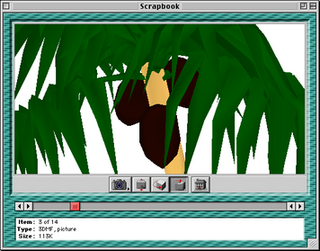 W
WScrapbook under the Classic Mac OS was a small desk accessory (DA) which enabled users to store images, text and sound clippings. It was included in the original Macintosh system software in 1984 with the Macintosh 128K, and was included throughout every Mac OS revision until Mac OS 9.
 W
WSimpleText is the native text editor for the Apple classic Mac OS. SimpleText allows text editing and text formatting, fonts, and sizes. It was developed to integrate the features included in the different versions of TeachText that were created by various software development groups within Apple.
 W
WSky Shadow is a 1990 Defender clone for the Mac OS, published by Casady & Greene. It was programmed by Patrick Buckland, author of the classic Mac Game Crystal Quest. In 1994 it was licensed from Casady & Greene by MacSoft and re-released for System 7 on CD-ROM.
 W
WSnapz Pro X is a utility program for macOS developed by Ambrosia Software. It is designed to record movie-like screenshots of a computer monitor doing various actions, such as a user moving their mouse across the screen, clicking on desktop icons, typing text, et cetera. It has been used commercially in the production of books, such as O'Reilly Media's series, The Missing Manual, and others. The program was also used by South Park to create the Make Love, Not Warcraft episode.
 W
WSoundApp is a freeware audio player for the Classic Mac OS. It was among the earliest MP3 players for the Classic Mac OS, and was widely praised for its ability to play back, and convert between, a variety of audio file formats.
 W
WSoundEdit was the first popular GUI-based audio editor for digitized audio. It was one of the first significant audio applications for personal computers in general.
 W
WSparkle is an open-source software framework for macOS designed to simplify updating software for the end user of a program. Sparkle's primary means of distributing updates is through "appcasting," a term coined for the practice of using an RSS enclosure to distribute updates and release notes.
 W
WTerminal (Terminal.app) is the terminal emulator included in the macOS operating system by Apple. Terminal originated in NeXTSTEP and OPENSTEP, the predecessor operating systems of macOS.
 W
WThe Unarchiver is a proprietary freeware data decompression utility, which supports more formats than Archive Utility, the built-in archive unpacker program in macOS. It can also handle filenames in various character encodings, created using operating system versions that use those character encodings. The latest version requires Mac OS X Lion or higher. The Unarchiver does not compress files.
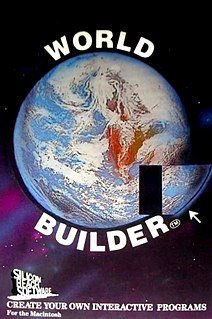 W
WWorld Builder is a game creation system for point-and-click adventure games. It was released in 1986 by Silicon Beach Software and had already been used for creating Enchanted Scepters in 1984. In 1994, World Builder along with Course Builder, SuperCard, and HyperDA was cited as the reason Appleton was "something of a legend". On August 7, 1995 developer William C. Appleton released World Builder as freeware.
 W
WxScope is a utility by The Iconfactory & ARTIS Software that can measure any element displayed on screen. The idea behind the program is that designers can check the size of their work against real-world computer display measurements and be able to measure their work as well.
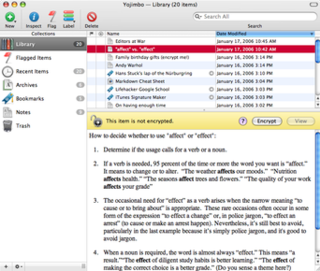 W
WYojimbo is a personal information manager for Mac OS X by Bare Bones Software. It can store notes, images and media, URLs, web pages, and passwords. Yojimbo can also encrypt any of its contents and store the password in the Keychain. It is Bare Bones' second Cocoa application.